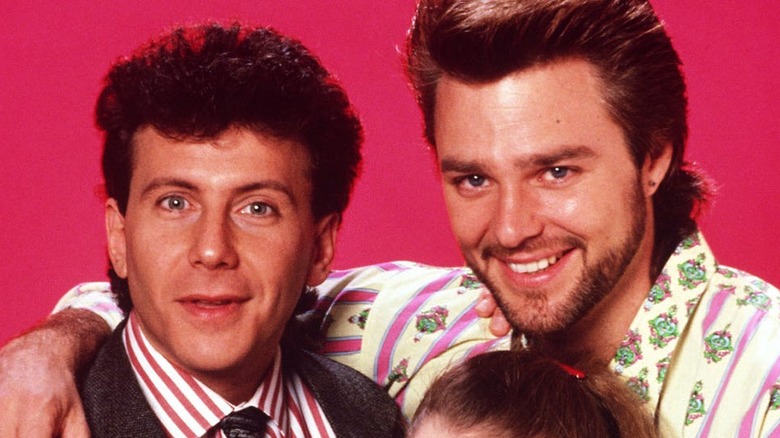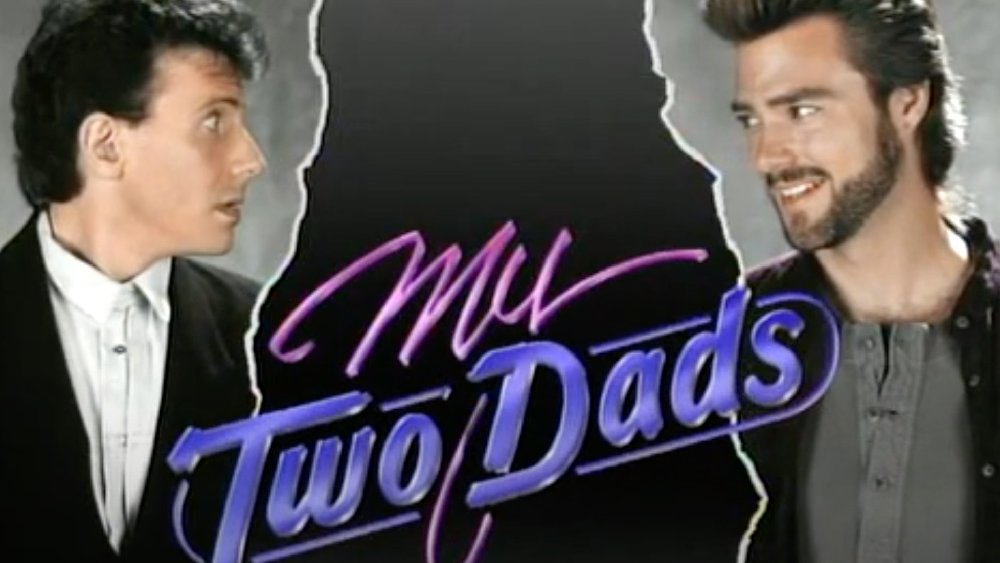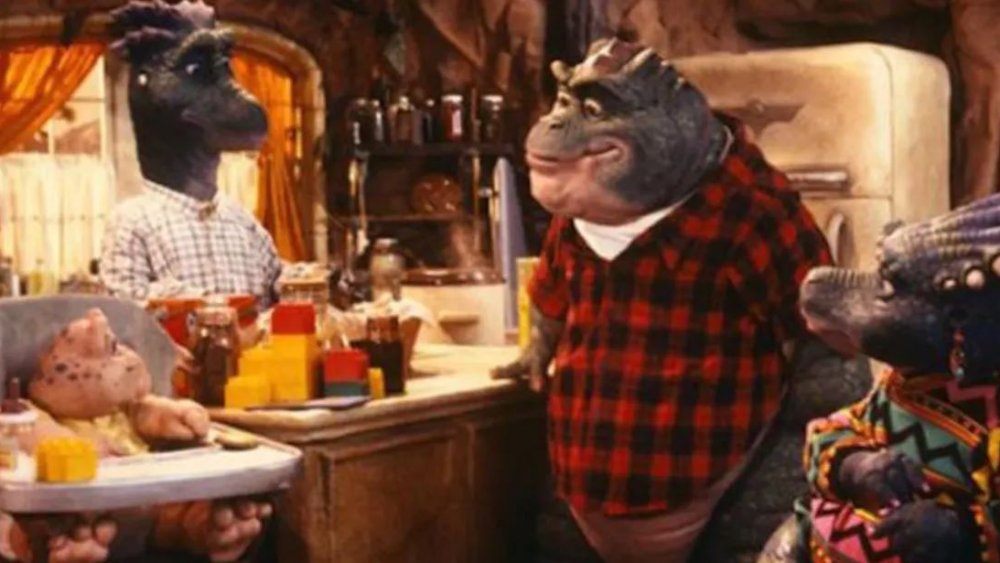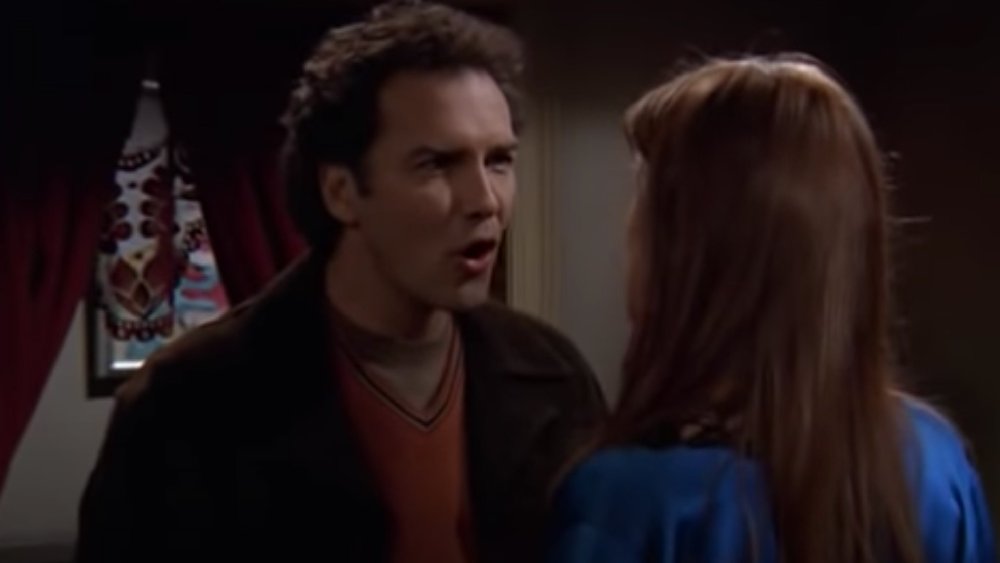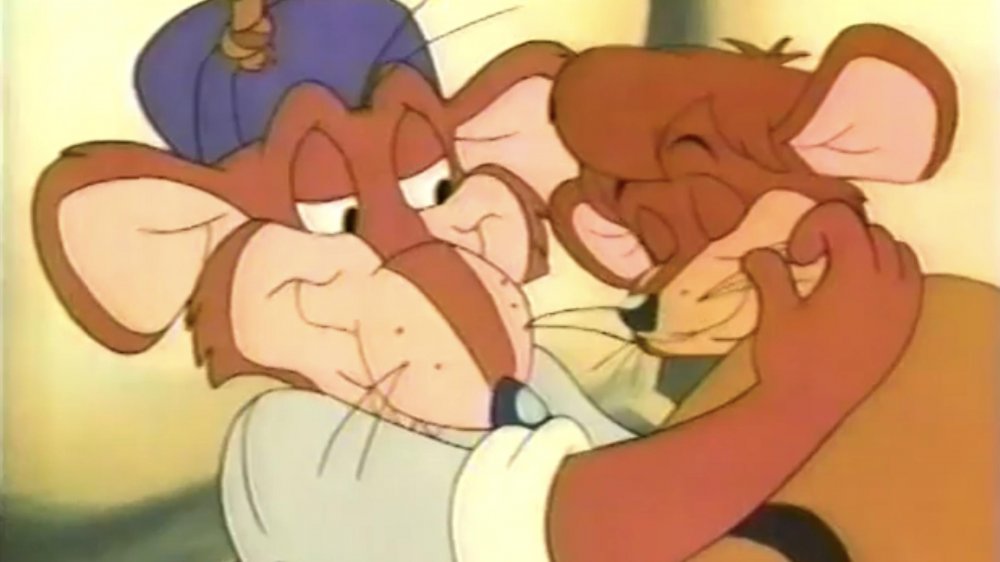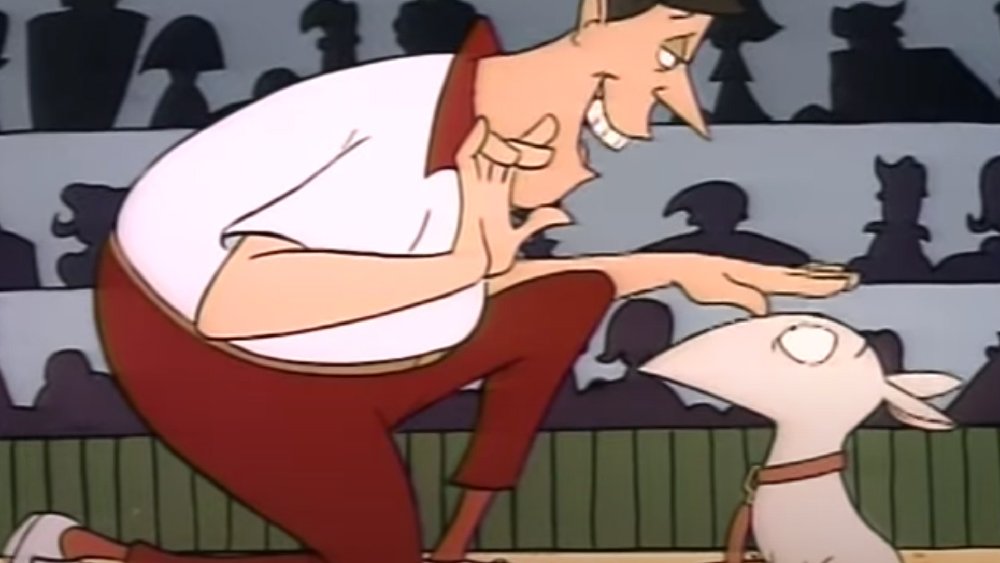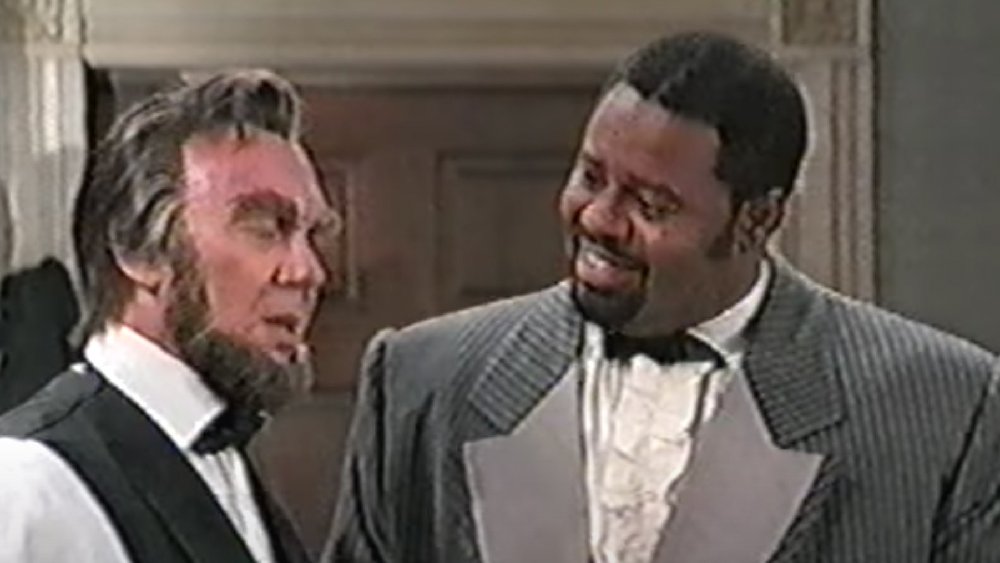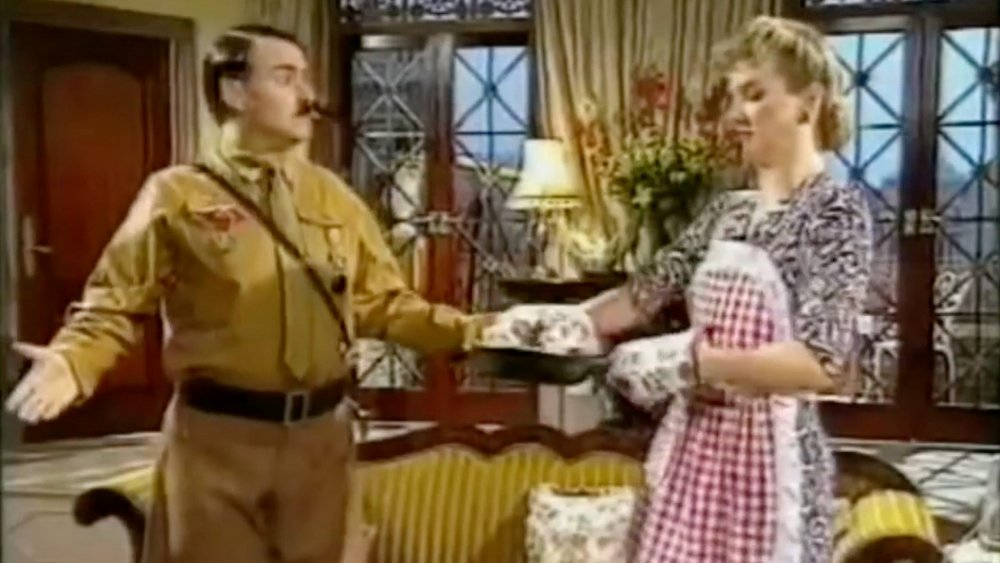'90s Sitcoms That Didn't Age Well
With topical references that can become dated by the time they hit the airwaves, as well as shifting ideas about who and what are acceptable targets for zingers, comedy tends to age faster than any other genre. If a sitcom is good enough, though, it can stand the test of time and endure to become a beloved classic. Just think about how many people use The Office as the comfort food equivalent of background noise almost a decade after it went off the air, or how many teenagers who weren't even born during its original run have marathoned their way through Friends on a 21st-century streaming service.
Unfortunately, those shows are few and far between, and for every bona fide classic that sticks around in syndication, there are a dozen shows that just don't hold up — and those are the lucky ones. Dig through the archives, and you're bound to find a handful of series that make it hard to believe they were ever broadcast on television. From quickly canceled mistakes to regrettably long-running disasterpieces, here are the '90s sitcoms that just didn't age well.
The 'crazy' plot of My Two Dads is normal by today's standards
My Two Dads barely made the cutoff for the '90s, with a third and final season that aired in the first spring of the decade. And back then, the premise probably seemed like enough of a novelty to sell the entire show. You know how a lot of kids are raised by their dad and their mom? Well, how hard would it blow your mind if you saw a young woman who was raised by a dad and ... a second dad?! Whaaaaaaaaaaaaat?!
Unless you're a time traveler from the late '80s, the idea of someone being raised by two men probably has you re-reading that last paragraph to see if you missed the twist that would make this setup interesting. There are, after all, plenty of reasons for that to happen even back then, let alone today, when most media has gotten better at depicting the reality of families that don't fit into that allegedly "traditional" mold that we've seen on everything from Leave It to Beaver to The Simpsons. That's it, though. Two guys raise a kid. Hijinks ensue.
To be fair, the actual details of the premise are a whole lot weirder. For one thing, both of these dudes hate each other as they once dated the same woman, and neither of them ever know they (potentially) have a daughter until a judge shows up with a court order that forces them into co-parenting in what definitely seems like some actionable judicial overreach. Also, one of them is a free-spirited artist, and the other one is an uptight businessman! What an original concept! Really, though, if you tried to run this past an audience today, they'd just be left wondering why the two dads weren't in a relationship themselves.
Dinosaurs is a straight-forward '90s sitcom with, you know, dinosaurs
When you get right down to it, the weirdest thing about Dinosaurs was that it managed to run for a full four seasons with the premise of "it's a regular sitcom, but instead of humans, it's dinosaurs in elaborate costumes operated by multiple puppeteers." Seriously, everything in the show is exactly like contemporary life in the early '90s without even having the veneer of Stone Age sight gags that you get on The Flintstones. Their TV isn't a paleolithic bird drawing pictures as fast as it can. It's just, you know, a TV.
To be fair, Dinosaurs was pretty forward thinking for its time, partly because it was a pet project that Jim Henson had been working on before his death in 1990. Most of the episodes make a solid attempt at social satire, taking on topics like religious extremism and corporate greed. Unfortunately, most satire ages about as well as a fresh avocado, and today's audiences are far more likely to see the show's attempts at dealing with social issues as either toothless — like the episode about gender roles that boils down to "men are acting like women, women are acting like men, isn't this hilarious" — or just downright inappropriate. Like, say, the episode where Monica is harassed at work by a character who is literally named "Sexual Harris," building to a joke where a trial is called to figure out what his intentions were with what he said, or what — sigh — "Sexual Harris meant." Woof.
Even if they got through all that, though, there's the whole thing where those four seasons end with the entire cast, including the baby, being explicitly doomed to a slow death by starvation and the extinction of their entire species. It's hard to imagine modern audiences thinking that's a good way to finish off your series. Then again, if you're watching a show about dinosaurs, you've gotta be prepared to see that ending coming.
The Norm Show never got funny
Have you ever seen Norm Macdonald, of Saturday Night Live fame, appear on a talk show to promote something? If you have, then you know that his usual tactic for getting through those interviews is to tell a long, meandering joke that takes up the entire segment, and it's so decidedly unfunny that it somehow loops back around to being hilarious. Now, imagine that instead of four minutes, that strategy was employed for three full seasons of a television show, but without the part where it ever got funny again.
That's The Norm Show, aka Norm, which squeezed out 54 episodes from 1999 to 2001 based around a premise that it's hard to imagine landing on television today. The idea was that Norm, played on Norm by Norm, was an ex-hockey player sentenced to be a social worker for the crime of tax evasion. Putting aside the incredibly suspect court decision, it gives us a sitcom about a guy who's forced against his will to help people and then just ... sort of ... doesn't.
That makes him a pretty tough character to get behind, but if that seems a little vague, don't worry. There's a specific example right in the very first episode, which concerns Norm taking the case of a woman named Taylor (Nikki Cox) and discovering that she's a sex worker. Despite her reluctance, he helps her to leave that life behind by telling her, and this is a direct quote, "You're a huge whore." It's the laugh line of the episode, and it's so effective that Taylor becomes a series regular, working with Norm as her boss. The average sitcom viewer 20 years later might still be willing to chuckle at the lowest common denominator, but we'd definitely hope that the lowest isn't quite as low as it used to be.
Capitol Critters was a shockingly dark '90s sitcom
After The Simpsons became a cultural phenomenon, other networks tried to jump on the trend by making their own adult-oriented animated shows. Unfortunately, they forgot to make them good, leading to a brief explosion of prime-time cartoons so bad that they make The Simpsons (season 26) look like The Simpsons (season 4).
The weirdest one of the bunch was Capitol Critters, a cartoon about all those rats in Washington, D.C. You know ... Congress? Zing! But seriously, it was about actual rats and mice who lived in the White House and were menaced by cats that were drawn as caricatures of George H.W. Bush and Dan Quayle. It's sort of like if you combined The West Wing with An American Tail and then made the resulting chimera drink grain alcohol until it couldn't see straight.
To be fair, the premise isn't inherently terrible, even if it would probably be better suited for a newspaper comic strip than a TV show (that only lasted for one season). The real problem here is that the episodes themselves were way darker than audiences at the time or today might expect. This is a series that started with an episode where a simple country mouse has to move to Washington after witnessing the graphic on-screen murders of his family by exterminators, including a sequence where he tries to tear a grate out of a wall to free his mother, as she's gassed to death. Two episodes later, the entire story is about the mice getting a gun — like an actual human-sized revolver — so that they can murder a cat who killed one of their friends in the episode's opening moments.
We don't really truck with the idea that today's generation is oversensitive or easily upset, but if audiences in 1992 rejected this thing, there's no way an audience in 2020 would want to deal with it. We've got our own problems, thank you.
Family Dog was uninspired and unlikable
Family Dog was created by Brad Bird, who would go on to direct animated classics like The Iron Giant and The Incredibles. And it got its start as an episode of the anthology series Amazing Stories, which was produced by Steven Spielberg and featured designs from Tim Burton. In other words, that's a pedigree that, on paper, should lead to a mind-blowing, underrated classic of animation.
Unfortunately, Family Dog is both miserable and shockingly uninspired. For evidence of the latter, look no further than the fact that there are two different episodes based around Jonah, the title pup, having to to deal with two larger, meaner dogs owned by two different sets of neighbors. Recycling a plot is one thing when you've got a long-running series, but Family Dog clocked in at ten episodes, one of which was a rerun of the Amazing Stories segment. Even that might be forgivable if the series had any of the charm that Bird would show in his later work, but Jonah's family is made up of a bunch of idiotic jerks so unlikable that even Family Guy fans would be left asking themselves, "Do these people have any redeeming qualities?"
It was justifiably short-lived in 1993, but one has to imagine that it would fare even worse today, after not only 30 years of The Simpsons but also 20 years of Adult Swim redefining what grown-up animated shows can be, especially ones focused on characters that viewers find it hard to like. This thing would be laughed out of the room by the creators of Squidbillies, but really, that would be for the best. If it hadn't, Bird might've never gotten to work on that movie about the big robot that wants to be Superman.
Over the Top sucks despite its impressive cast
Released in 1997, Over the Top sadly isn't about a trucker who somehow has to win both an 18-wheeler and custody of his estranged son in an arm wrestling tournament. Instead, it's a show about an out-of-work actor whose career has gone so sour that he has to move into a hotel full of wacky characters, run by the woman he was once married to for 12 days. Intrigued? Probably not, since it's a pretty generic premise, but here's the cast. Tim Curry stars as the actor, Annie Potts is the ex-wife, and Steve Carell is one of those wacky characters as a chef named Yorgo. By all rights, this series should've the combined comedic power of Ghostbusters, The Office, and Clue, and that should be enough to elevate even the worst premise into something worth watching.
Do not, under any circumstances, be fooled into checking it out. Curry, Potts, and Carell are all phenomenal talents in their own right, but Over the Top brought the weight of such crushing mediocrity down on them that they never had a chance. It was canceled after three episodes, and while the star power has earned it some interest via bootlegs, it's just not worth it. It's only made worse today by the fact that while two of those actors already had a respectable career under their belts, the third has gone on to become a sitcom icon.
Carell did manage to wring some comedy out of it eventually, though. At more than one awards show, he's read a review of Over the Top that goes, "I have stood in a freezer full of dead people at the morgue. I have seen a man's scalp pulled back over his nose. ... But I can now honestly say that until Steve Carell's turn in the premiere of Over the Top, I have never known true horror."
The Secret Diary of Desmond Pfeiffer hasn't aged well at all
You know what's not very funny? Slavery. If you read that and thought, "Well, duh," then congratulations, that was the correct reaction. If your reaction was, "Well, we could probably get some laughs out of it," then we've got some good news for you and only you. Somehow, against all odds, The Secret Diary of Desmond Pfeiffer exists.
Or at least, it existed for four weeks back in October 1998 on UPN, a network that apparently figured if nobody was watching anyway, they might as well do whatever they wanted. In this case, "anything" was a sitcom about Desmond Pfeiffer, played by Chi McBride in a role that could best be described as "slumming it," an English expatriate and con artist who came to America and got a job as Abraham Lincoln's valet during the Civil War. And surprise! The show didn't work at all! The jokes were built around Lincoln as a poor henpecked husband to a shrewish Mary Todd, Ulysses S. Grant's alcoholism, and how well-endowed Stonewall Jackson was. This show started with an episode about Abraham Lincoln sexting via telegram that was called "AOL: Abe On Line," and that's the joke that holds up best.
Needless to say, Pfeiffer's brief tenure was heralded by protests from the NAACP and critics who were left in disgusted disbelief by jokes in the pilot that apparently included Desmond narrowly escaping being hanged, a minstrel show number, and a joke about how Desmond should get his feet off the table because "the slaves haven't been emancipated yet." When that got out, UPN switched up the episode order and went with a slightly less offensive episode, which The Washington Post called "controversial and asinine" and "about as funny as getting your teeth cleaned." On the bright side, they did say that it "was not so much racist as it was stupid." So that's a plus, relatively speaking.
The years since haven't done Pfeiffer any favors. If anything, it seems like a worse idea now than it did then, which is saying something. These days, the show's lasting legacy is that it was mentioned as the favorite show of the characters on Clerks: The Animated Series, and really, when your lasting legacy is being dunked on by another show that only lasted six episodes, something definitely went wrong.
Heil Honey, I'm Home is the most offensive sitcom of the '90s ... and maybe ever
Heil Honey, I'm Home isn't just the most ill-advised sitcom of the '90s or the most ill-advised sitcom to ever be aired in the United Kingdom. It is, pretty unquestionably, the most ill-advised sitcom, and possibly the most ill-advised television show, of all time, full stop.
The premise on this one is such a monumentally bad idea that it was canceled after a single episode — although there were seven episodes that never made it to TV that stand as a shocking testament to how a large group of actors and crew members can be convinced to go along with just about anything. Worse still, the fact that is was a bad idea is baked into the premise. The whole thing opens with an explanation that these are long-forgotten episodes of an American sitcom that never aired, recently unearthed from its creator's archives. That, however, wasn't enough to prepare viewers for the rest of the show. Why? Because this was a sitcom about Hitler. Specifically, it was about Hitler and Eva Braun living next door to a Jewish couple named Arny and Rosa Goldenstein in Berlin in 1938, presented with purposefully corny sitcom gags, complete with a laugh track.
The idea here is that it was meant to be parody of sitcoms as a genre, based on the idea that the TV shows cranked out by Hollywood in the so-called Golden Age of Television would take any premise and boil it down to fit into a saccharine, sanitized view of Americana. The problem was that ... well, hopefully you've figured that out for yourself, but just in case ... it's a sitcom about Hitler. Now, it is possible — possible — to use a depiction of Hitler and Nazi Germany as a source for comedy, but if you're going to attempt it, you should make very, very sure that you're at least as good as The Producers. Unfortunately, as reviewer Mark Lewisohn put it with an extremely charitable choice of phrasing, "the show really wasn't very good."
Given that it tanked on its one and only airing, saying that this one hasn't "aged well" might not feel that accurate since it wasn't a good idea in 1990, either. That said, well, it definitely hasn't gotten any better in the past 30 years.
